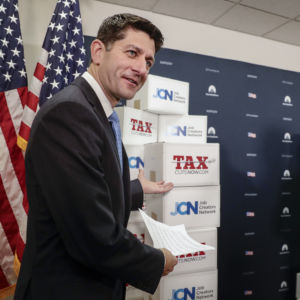Alan Blinder, a distinguished economics professor at Princeton and former vice chair of the Federal Reserve, has recently launched a broadside attack on the recently enacted tax-cut legislation. According to him, it favors corporations and not people; it favors the rich; and it “blows a large hole in the federal budget.”
He also claims that it “complexified” (that’s his word) the code rather than simplifying it, is not “distributionally neutral” and thrusts a “dagger into the heart of Obamacare.”
Professor Blinder seems to be shilling for the leaders of the Democratic Party, perhaps in hopes of being rewarded if it captures the White House in 2020. He may consider Treasury secretary or chair of the Federal Reserve as an appropriate reward for exchanging objectivity for ideology.
The charge about favoring corporations turns a fact on its head. The new law brings the corporate tax rate more in line with our competitors instead of keeping one of the highest in the developed world. The changes in corporate law also eliminate double taxation by adopting a territorial system and provides a strong incentive to repatriate $2 trillion that is being held overseas. So, yes it did favor corporations but in a way that will benefit the economy, which includes people.
To believe Professor Blinder’s charges you would have to believe that corporations are going to put all of their increased revenue in a mattress and do nothing with it or pass out financial rewards that are also put in mattresses instead of being used. That’s nonsense.
Corporations now have increased incentives to invest here instead of in other countries. Increased investment will create jobs and higher wages. Even in the short-run if corporations focus on stock buybacks, some investors will sell their holdings and either spend or reinvest their profits. Pension funds will increase in value and retiring workers will have larger pensions. Corporations might also choose to increase dividends that make shareholders better off. One way or the other, the increased revenue will circulate, and that will produce benefits.
Professor Blinder should review his profession’s literature to clarify his understanding of the beneficiaries of tax cuts. An article by the National Bureau of Economic Research concludes that the benefits accrue almost equally to companies and their shareholders and workers. A National Review article on the benefits of tax-law changes also included a summary of the economic literature that strongly contradicts Blinder’s allegations.
As for his comments about individual tax reform, he again is blowing hot air. To begin with, doubling the standard exemption will reduce the number of taxpayers who itemize. That is currently 40 million taxpayers according to the IRS. Couples, for example, who have deductions up to $24,000 can file on a simpler form, saving both time and money if they use a tax preparer. That is simplification. It is not as much as many would like but it is a step in the right direction.
Presently, 45 percent of taxpayers pay no federal tax and about 10 percent pay 70 percent of personal tax revenue. That skewed distribution makes increasing progressivity an illusion and guarantees that any reduction in rates will benefit those who are in the higher tax brackets since they pay most of the taxes. So, when Professor Blinder complains about a lack of progressivity, he is engaging in political rhetoric.
Estimates of the effect of this legislation on economic growth and the deficit are just that — estimates based on models that don’t have the best record for accuracy. What is certain is that workers and companies will be able to keep more of the money that they earn instead of sending it to the federal government.
If Professor Blinder is really interested in shrinking the deficit, he should be advocating for a major reorganization of the executive branch, along the lines of the 1947 Hoover Commission and changes in Social Security to make it more self- sustaining and reflective of today’s work force and life expectancy.

